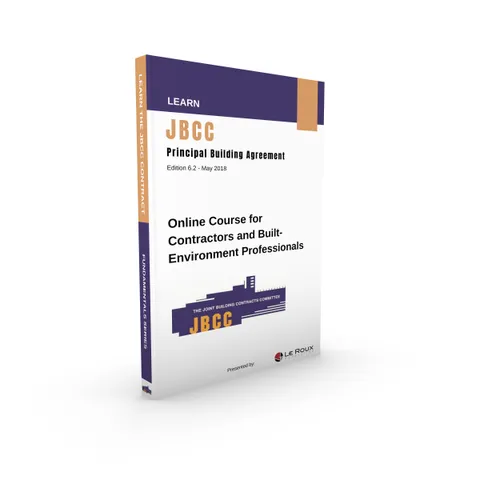Can amounts be deducted from a JBCC interim payment certificate due to defective work?
Contractors are often blindsided by an abrupt reduction in the value of work that is certified for payment, by the principal agent in an interim payment certificate. This reduction is then made as a result of “defective work”.
To understand the problem from the Contractor’s point of view. Contractors have to make significant purchases of materials and pay for the labour and overheads required to perform the works. The progress they make is then valued each month at the rates specified in the priced document and included for payment in the interim payment certificate.
If the actual value of work performed is not accurately reflected in an interim payment certificate, the Contractor ends up with a cash imbalance by having a cash outflow in excess of the corresponding cash inflow. A problem which many Contractors have an undesirable level of experience with.
Having defective work removed from an interim payment certificate, can therefore wreak havoc with the Contractor’s cash-flow and leave many Contractors frustrated and desperate.
It thus begs the question, can the principal agent or delegated agent such as the Quantity Surveyor reduce the value of an interim payment certificate with the value of work that is deemed or even proven to be “defective”?
Common Law position
From a common law position, an Employer would have the right to reduce the contract value by an amount commensurate to the cost of remedying a defect caused by a Contractor. If the price for the work has already been paid, the Employer can claim damages for this amount.
However, as with all common law provisions, the particular contract may alter the common law position of the parties and JBCC, like many other building contracts, have clauses that obligates the Contractor to rectify and remedy any defects within a stipulated period of time or particular period.
This prohibits the Employer from simply rectifying defects in the course of the construction project and deducting amounts. They must follow due process and allow the Contractor to operate as per the rights and obligations laid down by the contract.
JBCC clauses on defect rectification
There are a few important clauses in JBCC dealing with the rights and obligations of the parties pertaining to defects:
- It is important to observe that “defects” in this article should be confined only to those which satisfy the definition of a defect in terms of JBCC and also only those defects which arise from the contractor’s own default. In other words, there may be items that could be construed as defects in laymen’s terms, or defects in free issue materials which would not satisfy the JBCC definition of a defect at the risk of the Contractor.
- The first mention of the obligation of the Contractor to remedy defects is found under point E2.0 of the Contract data of the JBCC. It refers to the offer and acceptance and forms part of the Contractor’s offer by stating to: “…execute and complete the works and to remedy any defects in conformity with the specification for the tender amount stated”. It is therefore an express obligation of the Contractor to remedy defects as part of their main performance.
- Secondly, we find the Employer’s right to issue Contract Instructions (via the Principal Agent) to the Contractor regarding the: “Rectification of defects”. Also, issuing lists specifying outstanding defects to be rectified in order to achieve practical or final completion. (Clause 17.1.11 and 12).
- There rests an explicit obligation on the Contractor to progressively attend to such defects through clause 17.2 which states that: The Contractor shall comply with and duly execute all contract instructions. Furthermore, failing to do so, the Principal Agent may give notice to the Contractor to proceed. Failing to proceed within five (5) working days of receipt of such notice, the Employer may then engage others to carry out the work and recover expense and loss so incurred through the recovery statement.
From these provisions, it’s clear that a Contractor:
(a) must remedy defects as they occur,
(b) the Principal Agent may instruct the Contractor to remedy any defects discovered during the course of the project,
(c) the Contractor must diligently attend to such an instruction and
(d) if they fail to do so, the Employer could employ others to do it and deduct amounts from the Contractor.
For the latter it’s important to note this is not an arbitrary deduction and certainly not a deduction due the mere existence of a defect. The Employer must follow the contractual provisions and conditions and employ others to perform the rectification for such a deduction to take place.
What about the Interim Certificate, can the value be reduced?
With reference to interim certificates, the Principal Agent is under an obligation to issue a payment certificate to the contractor each month by the due date stated in the contract date. The JBCC further states that such a payment certificate shall include “A fair estimate of the value of work executed"(clause 25.2-3, Own emphasis added).
It follows that certain deductions can be made on this interim certificate as per the recovery statement between the parties. However, it’s important to note, nowhere in the recovery statement is there a provision which allows for the deduction of defective work per se. As we’ve seen and mentioned earlier, there is indeed a right to deduct any expense which could result from failing to correct a default diligently, but this does not in any way confer a direct right to recover money due to a defect.
It appears therefore that, on the simple wording of the contract, there exists no right for the Employer nor the Principal Agent, to deduct any value from an interim certificate, purely because the work or a portion of work is deemed defective. Once work is executed, the value must be included in an interim certificate.
What about Employer risk? If a concrete slab is proven to be defective and will require a complete re-construction, is it not a risk to certify that value as part of the interim certificate?
It’s important to remember that contracts are not primarily concerned with the parties’ subjective interpretation of fairness or an absolute commitment to escape risk. The contract is the record of promises made by the parties to each other and within it, each party carries their own level of risk, liability, rights, and obligations which are separate from what may be construed as a being fair or reasonable.
For instance, (in oversimplified terms) when it rains, the Employer cannot levy a penalty for delays caused by the rain and may lose income. The Contractor on the other hand cannot claim any additional overhead cost as a result of the delay and also suffers loss. Each party may argue it’s unfair from their vantage point because rain is beyond their control, why should they suffer its detriment. However, the contract dictates how the parties agreed to apportion the risk and liability in this instance and those terms stand in isolation of our respective idea on fairness.
The same principle will apply here. The JBCC contract is clear, work executed shall be added to the interim certificate and paid to the Contractor. There is no provision allowing for the removal of defective work from this value. The Contractor has the liability and obligation to correct any defects and the Employer finds protection under those terms.
However, in scenarios where a defect significantly compromises the quality of work to the extent that the work cannot be deemed completed or part of "work executed", the value stated in the payment certificate may lawfully be adjusted. Such an adjustment shall be within the provisions of the JBCC, but the crucial determinant in such cases is whether the work can be considered executed according to contractual standards or not.
An example of this could be a concrete slab that is condemned to be redone. Knowing that this work would have to be demolished and recast, it already renders the slab lacking and would probably provide a sound reason not to include it as part of executed work.
For other defects, the Employer still finds protection for the risk in another mechanism of the JBCC referred to as security. This is exactly because progress certificates are not necessarily 100% accurate and it is a common understanding in the built environment that defects, or other problems may appear in a portion of certified work, even after it has been paid for.
No right to unilaterally decrease risk for one party at the expense of the other
These securities, either retention or the performance bonds carry a significant cost and/or risk for a Contractor to provide. These are the terms the parties agreed upon:
The Contractor incurs cost to provide security in the form of retention or a bond to protect a portion of the Employer’s risk. The Employer on the other hand agreed to find this security acceptable cover for his risk.
If the Employer requires more cover and less risk, it needs to be stated and agreed upon at tender stage so that the Contractor can contemplate if they are willing to provide this higher level of security and most importantly, they need to price for it.
If the Employer requires more cover and less risk after the tender and contract is concluded, it becomes a variation to the terms of the agreement. Effectively, when a Principal Agent omits a portion of value from an interim certificate due to defective work, the Principal Agent is unilaterally altering the provisions of the JBCC agreement between the Employer and Contractor.
This not only constitutes a breach of contract (Clause 6.1: “The principal agent has no authority to amend this agreement”), but it could also find the Principal Agent liable for a negligent discharge of duties by not acting fairly. Essentially a Principal Agent in this position is unilaterally changing the terms of the agreement beyond their authority, creating more security for the Employer at the expense of the Contractor. Something that should require stark investigation and could find the Principal Agent liable to claims for loss and expense by the Contractor to the Employer.
Manage fairly
The best way forward under a circumstance where a large portion of work is defective, is to certify value as executed and then issue an instruction for rectification. Manage and monitor the progress of the work and if necessary, employ others to rectify. The removal of work for re-execution would again entitle the Principal Agent to remove it from the following interim payment certificate to protect the interest of the Employer within the ambit of the contract.
Reference – Any reference to the JBCC in this article refers to the JBCC Principal Building Agreement Edition 6.2, May 2018.
Kindly note that our posts on social media and our website do not constitute professional or legal advice in any manner. It is designed to stimulate discussion and share ideas and the comments and opinions made and/or conclusions drawn from these posts must be evaluated with discretion by our readers at their own risk.
Want to master the JBCC? Enroll in the Course...
Whether you're a contractor, an architect, a lawyer, or a student, this JBCC course will equip you with the knowledge and skills to interpret, manage and implement the JBCC contract like a pro.
R 5 897



